
Hollywood, Swing Time & King Records Rhythm & Blues
various artists
Support www.hipchristmas.com! Shop at Amazon, Apple Music, and more...
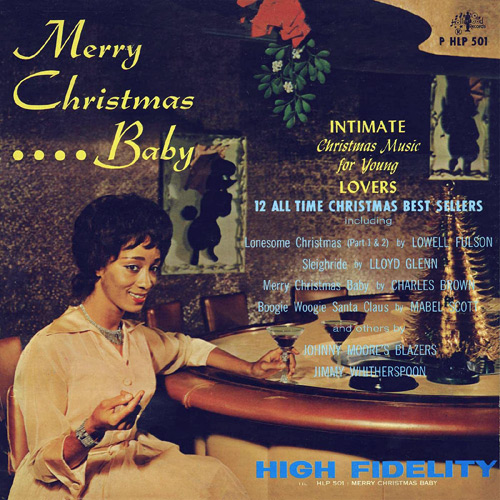 The
Christmas music legacy of Hollywood Records is both glorious and shameful, encompassing
some of the greatest holiday rhythm & blues ever waxed and some of the
shabbiest reissues in the history of record collecting. Their history is a
twisted tale, too, but I'll try to keep it short and simple: the recordings
of three West Coast rhythm & blues labels ended up under one roof when
Swing Time Records bought the masters of Exclusive (1950) and Supreme (1951).
Now, Christmas classics by Charles Brown, Lowell Fulson, and others were all owned
by Swing Time. When Swing Time folded in late 1954, they sold their masters
to Los Angeles imprint Hollywood Records, who subsequently issued Merry
Christmas Baby (1956), compiled from their own catalog as well as the rich
Swing Time vaults.
The
Christmas music legacy of Hollywood Records is both glorious and shameful, encompassing
some of the greatest holiday rhythm & blues ever waxed and some of the
shabbiest reissues in the history of record collecting. Their history is a
twisted tale, too, but I'll try to keep it short and simple: the recordings
of three West Coast rhythm & blues labels ended up under one roof when
Swing Time Records bought the masters of Exclusive (1950) and Supreme (1951).
Now, Christmas classics by Charles Brown, Lowell Fulson, and others were all owned
by Swing Time. When Swing Time folded in late 1954, they sold their masters
to Los Angeles imprint Hollywood Records, who subsequently issued Merry
Christmas Baby (1956), compiled from their own catalog as well as the rich
Swing Time vaults.
Subtitled Intimate Christmas Music For Young Lovers, original vinyl copies of Merry Christmas Baby now sell for hundreds of dollars. The cover art featured an attractive black woman seated at a bar, smoking. Interestingly, the label also issued a version with a painting of the bar - cigarettes intact, but no black woman! Presumably, this version was marketed to the white audience. Hollywood also issued a six-song EP excerpted from the same stellar material, using the generic cover art. Later, probably 1965, they issued yet another version of the LP with a different black woman - still smoking, but standing this time - and that's the version first issued on CD.
Hollywood Records, actually, had been purchased in 1953 by country-oriented Starday Records (Cowboy Copas, Red Sovine). Starday had been founded in Beaumont, Texas, and later consolidated with Hollywood in an L.A. office. In 1957, both labels moved to Tennessee, where Hollywood Records was shuttered in 1959. In 1968, Starday purchased Cincinnati-based King Records, adding the rich catalogs of the King, Federal, and DeLuxe labels to their already significant holdings. Beginning in 1971, Starday itself was sold several times, eventually landing in 1975 under the auspices of Nashville-based, budget-oriented Gusto Records. Quickly, Gusto began reissuing dozens of classic LP's using the variety of labels at their disposal - Hollywood, among them.
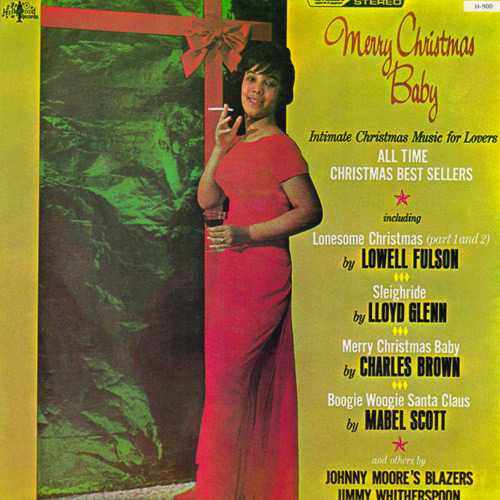 Going For The Gusto
Going For The Gusto
When Merry Christmas Baby was reissued by Gusto in 1978, they stirred material from the King Records archives into Hollywood's already potent stew - most notably two sides from guitarist Freddie King. Simply called Merry Christmas Baby, the front cover of the new LP had evolved to reflect the times, switching from a light-skinned, straight-haired Negro beauty of the 1965 edition to a darker, stronger, Afro-American vixen more typical of the disco age. Appearances aside, the music was strictly vintage black pop, none of it dating later than 1961 - and nearly all of it flat-out, drop-dead awesome. Eventually, both versions of Merry Christmas Baby were issued on compact disc, and Gusto (under the Hollywood imprint) also used most (but not all) of the Merry Christmas Baby material to produce a 20-song CD entitled Rhythm And Blues Christmas (1988). The extra tracks included more superb King material (Hank Ballard, Amos Milburn) along with some inexcusable, inappropriate crap. (Years later, Gusto issued a very similar album with a slightly different title and track listing but totally different cover art.)
The good news? Collectively, the Christmas music of Swing Time, Hollywood, and King Records is magnificent - some of the best ever recorded. The bad news? These are some of the most horribly mastered and packaged Christmas CD's ever thrust on an undeserving public. Now, here's the rub. While the music therein is generally sublime, these (and subsequent) releases overlap tremendously. So, you'll have to buy at least two of these monumental travesties to collect all of this vital music - which you will if you're as nutty about this stuff as I am - which you are if you're still reading this far down the page! These are the situations, I suppose, for which the good Lord made the mix tape - or the CD burner, or the iPod, or the playlist, or whatever we invent in the future....
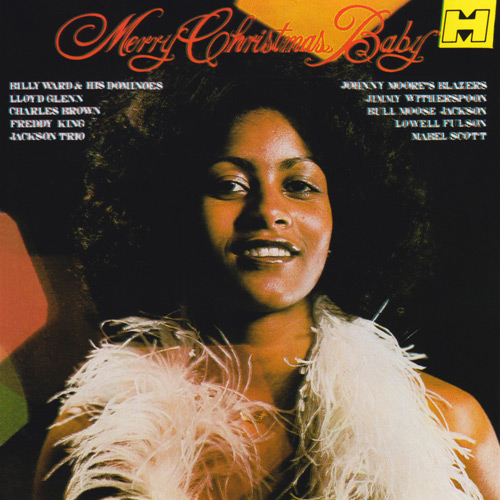 A Wholly Nontraditional Holiday
A Wholly Nontraditional Holiday
But really - these are shamefully botched compact discs, especially the two Merry Christmas Baby reissues. Most heinously, they are mastered from extremely scratchy LP copies - not from the master tapes that no doubt existed at one point, at least for the mid-50's recordings and later. Adding insult to injury, the cover art is positively mangled, looking as though it were reproduced on a mimeograph machine in dire need of a cleaning. Of course, Gusto provides scant annotation, but what's worse, they stick a big, ugly barcode over what appears to be the original liner notes of both LP's - argh! Rhythm And Blues Christmas, while produced specifically for CD, is only marginally better. Consisting primarily of cuts from the King and Federal vaults (deemphasizing the Swing Time family of labels), the mastering of Rhythm And Blues Christmas is lackluster, though noticeably improved. That's fine, but a few of these tracks have about as much in common with genuine rhythm & blues as my grandmother. I mean, who the hell are the King Karoleers? The Trailblazers? The Galation Singers? I have no idea, but they sure as shit ain't rhythm & blues...
All kvetching aside, however, most of the music featured on Merry Christmas Baby (and its bargain basement offspring) is spectacular. In an era when most Christmas music was family-oriented or religious in nature, Merry Christmas Baby presented a wholly nontraditional holiday, with scant mention of Rudolph, Frosty, Santa Claus, or Jesus Christ. Rather, Christmas was seen as a time for love and sex, loneliness and tears - and for throwing a helluva party. In the swankiest way yet heard, Merry Christmas Baby personalized the Christmas experience for the urban black community, sparking a tsunami of incredible Christmas records that wouldn't subside till the early 1970's.
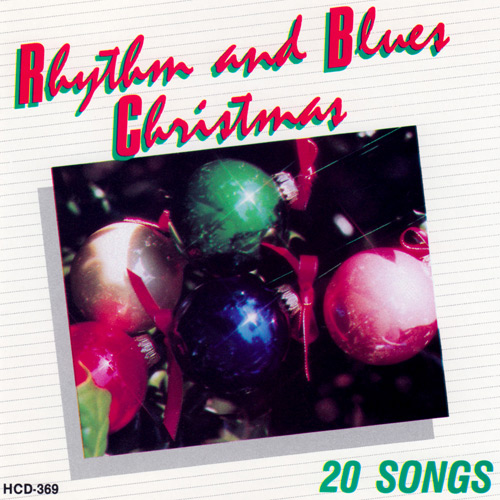 The Jolly Old Elf Redefined
The Jolly Old Elf Redefined
So let's talk about the music. First and foremost, we've got "Merry Christmas Baby" by Johnny Moore's Three Blazers (Exclusive, 1947) featuring cool cucumber Charles Brown very early in his career. Brown's 1956 solo version for Aladdin Records is definitive, but the original Exclusive rendition is thoroughly charming and sexy - in a word, essential. Be aware, though, that Brown would record the song many times during his long career, and the song itself would become a standard.
On the uptempo tip, Mabel Scott's "Boogie Woogie Santa Claus" (Exclusive, 1948) sets a milestone. Scott, who was briefly married to Brown, paints St. Nick in thoroughly adult terms, igniting a trend which completely redefined the Jolly Old Elf. On later records from the same period, Santa would be-bop, mambo, rock & roll, and do the twist. Other songs, like Lowell Fulson's "Lonesome Christmas" (Swing Time, 1950), Jimmy Witherspoon's "How I Hate To See Christmas Come Around" (Supreme, 1948), or Freddie King's "Christmas Tears" (Federal, 1961) were nothing less than consummate blues records - they just happened to be about the holiday season.
Many of the Hollywood masters, however, were happier, nominally conventional affairs. The Jackson Trio's "Love For Christmas" (Hollywood, 1955), Johnny Moore's "Christmas Dreams" (Hollywood, 1956), and Lloyd Glenn's "Sleigh Ride" (Swing Time, 1951 - not the famous Leroy Anderson composition, by the way) all couched Christmas in sweeter terms but were exceedingly soulful, nonetheless. One such song, "Christmas In Heaven" by Billy Ward & The Dominoes (King, 1953) features a novice Jackie Wilson on vocals and is prototypical of the sort of over-the-top melodrama Wilson would later hone to a sheen at Brunswick Records. Meanwhile, the later King-Federal cuts (such as those exclusive to Rhythm And Blues Christmas) introduce elements of rock 'n' roll to the proceedings. Hank Ballard & The Midnighters - most famous for their bawdy "Work With Me Annie" - rock the house with "Santa Claus Is Coming" (King, 1963), whereas Amos Milburn - sounding like a leaner Fats Domino - adopts a comfortable gallop on "Christmas (Comes But Once A Year)" (King, 1960).
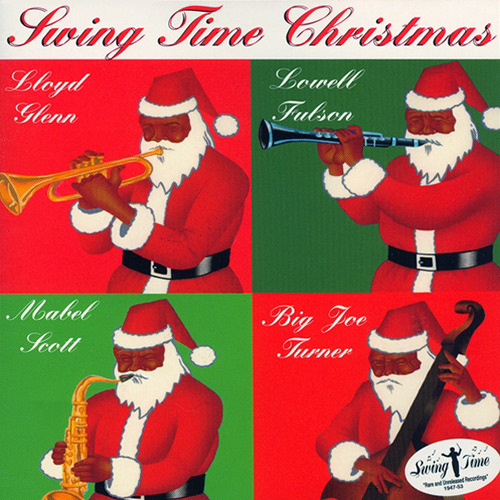 It's Swing Time!
It's Swing Time!
All of which argues that somebody should reissue this historic music with the love and respect it warrants. And, it merits mention that several labels, including Rhino, Collectables, and Real Gone Music, have reissued lots of music under the Hollywood umbrella, and they've done so (usually) with great care. But, no one has assayed the Christmas catalog, and I doubt they ever will.
New York independent label Night Train took a step in the right direction, at least, with their Swing Time Christmas (1995), which captures a heapin' helpin' of Christmas tracks recorded for Swing Time and various affiliated labels. In addition to several mentioned above, Swing Time Christmas compiles exceedingly rare tracks from the likes of Big Joe Turner ("Christmas Date Boogie," 1948), Dexter Gordon ("Jingle Jangle," 1952), and Lowell Fulson ("Christmas Party Shuffle," 1952). Most delightfully, however, we are treated to Jesse Thomas' original version of "Christmas Celebration" (which B.B. King rode to great acclaim for Kent Records in 1962) and a bizarre track by Cecil Gant (who also recorded as Gunter Lee Carr). In "Hello Santa Claus," Gant makes explicit the divinity of Saint Nicholas, promising "God will bring Santa Claus to you." Wow!
On the downside, Swing Time Christmas largely cleans up the same crappy masters as used on Merry Christmas Baby, and it (logically) ignores the Hollywood and King-affiliated material recorded after Swing Time ceased to exist. And, Night Train is a very small, poorly-distributed label, so Swing Time Christmas may be tough to find. Keep looking, though - it's worth it!
It's also worth mentioning that Capricorn Records, a label that rode the Southern rock train to glory in the early 1970's (most famously with the Allman Brothers), was revived in the 1990's by Warner Brothers and put out the excellent Swing Time Records Story, a two-disc boxed set, in 1993. In the liner notes, the producers observe that "some of Swing Time's biggest hits were Christmas singles," and they promise a blues and R&B Christmas collection in the near future. Sadly, Capricorn's fortunes waned (again), and it never happened.
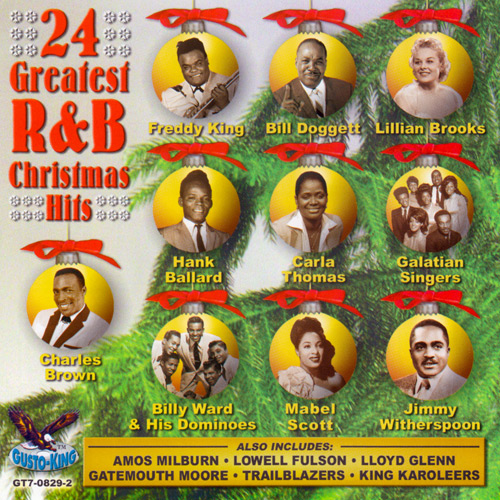 What about the Godfather?
What about the Godfather?
Astute observers will note that funk potentate James Brown recorded for King Records for many years, and yet his copious Christmas music for the label is not included on any of the records discussed herein. Why, you ask? Starday Records - who purchased King in the late 60's - sold Brown's King masters to Polygram in the early 70's before Starday itself was sold to Gusto a few years later. Thankfully, the Godfather's yule glory is preserved on albums like Rhino's Santa's Got A Brand New Bag (1988), Polygram's Funky Christmas (1995), and - most impressively - Hip-O's The Complete James Brown Christmas (2010).
So, the list of essential songs below does not include any James Brown. But, it includes all the best rhythm 'n' blues tracks from the albums discussed on this page, including the only other full-length Christmas albums released by rhythm 'n' blues artists on the Hollywood, Swing Time, and King family of labels: Bill Doggett's 12 Songs Of Christmas (King, 1958) and Charles Brown Sings Christmas Songs (King, 1961). It also includes a handful of stray R&B tracks never anthologized by those labels or their eventual corporate overseer, Gusto. Be aware, however, that a fair amount of Christmas music in other genres - most significantly, country music released on the Starday and King labels - is controlled by Gusto.
Postscript
I wrote the original draft of this article in the early 2000's, not long after chasing down a copy of Swing Time Christmas, which helped fill in some historical gaps for me. Over the 20-or-so years that followed, the dire state of the King/Hollywood legacy didn't improve much - until it did (sort of). I first got my hopes up in 2007 when Gusto hauled out the old masters once again for 24 Greatest R&B Christmas Hits, issued first as a compact disc and later for download and streaming. Gusto had been fairly active leading up to that release, issuing quite a few download-only albums through online outlets. Some of them, like the Billy Ward reissues, sounded pretty good. Sadly, while 24 Greatest R&B Christmas Hits included a few tracks heretofore unavailable on CD, it was mastered from the same old scratchy vinyl, this time with a layer of reverb slathered on top to mask the defects. Idiots!
A few years later, widely respected reissue specialist Real Gone Music compiled two fine double-disc sets of King and Federal singles by Freddie King and Billy Ward & His Dominoes. Both contained all of their Christmas sides, and both sounded spectacular compared to previous Gusto reissues.
And then in 2021, Real Gone Music reissued the original 1956 edition of Merry Christmas, Baby. So, a dream come true, right? Not so much. To be fair, it is the best-ever edition of one of the most important albums in the annals of popular Christmas recordings - nicely packaged, with an informative essay by Bill Dahl (though the track annotation was rather thin). But, sadly, it was not the major sonic upgrade I'd hoped for. While the sound is considerably better than previous versions issued through Gusto Records, the album was clearly not mastered original tapes - which I think we can now conclude no longer exist, if they ever did. (Some of these songs were cut before the use of magnetic tape for recording was widespread, especially for independent labels like Hollywood). The most I can say is that Real Gone Music did the best they could with what they had. Another complaint - and one quite out-of-character for Real Gone - is that they opted to not include any bonus material, most egregiously from the rich King archive. All the same, it was about freakin' time, and I expect that this is the best rendering of Merry Christmas, Baby we'll ever get. [top of page]
Selected Albums
- Merry Christmas Baby (Intimate Christmas Music For Young Lovers) (1956)
- 12 Songs Of Christmas (Bill Doggett, 1958)
- Charles Brown Sings Christmas Songs (1961)
- Merry Christmas Baby (Intimate Christmas Music For Lovers) (1965)
- Merry Christmas Baby (1978)
- Rhythm And Blues Christmas (1988)
- Swing Time Christmas (1995)
- 24 Greatest R&B Christmas Hits (2007)
- A Rhythm & Blues Christmas (2009)
Essential Songs
- Blue Christmas (Bill Doggett, 1958)
- Boogie Woogie Santa Claus (Mabel Scott, 1948) Top 100 Song
- Christmas Blues (Charles Brown, 1961)
- Christmas Blues (Gatemouth Moore, 1947)
- Christmas Celebration (Jesse Thomas, 1951)
- Christmas (Comes But Once A Year) (Amos Milburn, 1960) Top 100 Song
- Christmas Date Boogie (Big Joe Turner, 1948)
- Christmas Dreams (Johnny Moore's Three Blazers, 1956)
- Christmas Eve Baby (Johnny Moore's Three Blazers, 1955)
- Christmas In Heaven (Billy Ward & The Dominoes featuring Jackie Wilson, 1953)
- Christmas Letter (Johnny Moore's Three Blazers, 1956)
- Christmas Letters (Carol Ford, 1968)
- Christmas Tears (Freddie King, 1961) Top 100 Song
- Christmas Time For Everyone But Me (Hank Ballard & The Midnighters, 1963)
- Christmas With No One To Love (Charles Brown, 1961)
- Hello Santa Claus (Cecil Gant, 1950)
- How I Hate To See Christmas Come Around (Jimmy Witherspoon, 1948) Top 100 Song
- I Hear Jingle Bells (Freddie King, 1961)
- I Saw Mommy Kissing Santa Claus (Bill Doggett, 1954)
- I'll Be Home For Christmas (Bill Doggett, 1958)
- I'll Be Home For Christmas (Bull Moose Jackson, 1951)
- It's Christmas All Year 'Round (Charles Brown, 1961)
- It's Christmas Time (Bubber Johnson, 1950)
- It's Christmas Time Again (Cecil Gant, 1950)
- Jingle Bell Hop (Jackson Trio, 1955)
- Jingle Jangle Jump (Dexter Gordon, 1952)
- Let's Make Every Day A Christmas Day (Bubber Johnson, 1950)
- Lonesome Christmas (Lowell Fulson, 1950) Top 100 Song
- Love For Christmas (Jackson Trio with the Ebonaires, 1955)
- Merry Christmas Baby (Charles Brown, 1968)
- Merry Christmas Baby (Johnny Moore's Three Blazers featuring Charles Brown, 1947)
- My Most Miserable Christmas (Charles Brown, 1961)
- Please Come Home For Christmas (Charles Brown, 1960) Top 100 Song
- Ringing In A Brand New Year (Billy Ward & His Dominoes, 1953)
- Santa Claus Is Coming (Hank Ballard & The Midnighters, 1963) Top 100 Song
- Sleigh Ride (Lloyd Glenn, 1951)
- What Are You Doing New Year's Eve? (Billy Ward & His Dominoes, 1965)
- Winter Wonderland (Bill Doggett, 1954)
- Wrap Yourself In A Christmas Package (Charles Brown, 1961)
Further Listening
- Blue Yule: Christmas Blues And R&B Classics (various artists, 1991)
- Charles Brown Sings Christmas Songs (Charles Brown, 1961)
- Christmas Blues: Savoy Jazz Christmas Album (various artists, 1994)
- Funky Christmas (James Brown, 1995)
- Hipsters' Holiday: Vocal Jazz And R&B Classics (1989)
- Legends Of Christmas Past: A Rock 'n' R&B Holiday Collection (various artists, 1992)
- Smooth Grooves: A Sensual Christmas (various artists, 1999)



